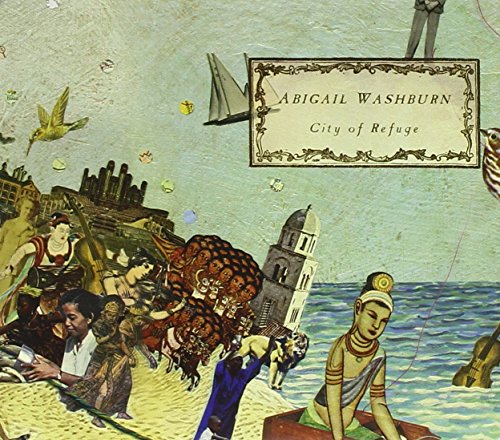
Abigail Washburn
City of Refuge
Release Date: Jan 11, 2011
Genre(s): Bluegrass, Country, Folk, Americana, Pop/Rock, Adult Alternative Pop/Rock, Alternative/Indie Rock, Contemporary Singer/Songwriter, Contemporary Folk, Alternative Singer/Songwriter
Record label: Rounder
Music Critic Score
How the Music Critic Score works
Buy City of Refuge from Amazon
Album Review: City of Refuge by Abigail Washburn
Great, Based on 9 Critics
Based on rating 9/10
There’s a tune on Abigail Washburn’s debut that I’ve kept returning to since I first heard it. Called “Backstep Cindy / Purple Bamboo”, it’s an old-timey banjo tune that, halfway through, morphs into a traditional Chinese flute piece, arranged in this case for banjo, fiddle and cello. Like the best of Washburn’s work, the tune gracefully bridges a gap between the traditions of two different cultures.
Based on rating 9/10
City of Refuge, the ambitious third album by singer, songwriter, and banjoist Abigail Washburn, extends the reach of both the stripped-down roots sounds on Song of the Traveling Daughter and the more musically exploratory Abigail Washburn & the Sparrow Quartet. She’s been seasoned by continually playing with stellar musicians and opening herself to musical traditions from those of the Deep South and the British Isles to folk traditions from Asia, jazz, and rock. This set showcases her singing and lyrics up front.
Based on rating 8.7/10
Abigail Washburn may have married the country’s foremost banjo star in 2009, but don’t call her Mrs. Béla Fleck. Having spent the past half-decade dividing her attention between the Sparrow Quartet and Uncle Earl, she steps out on her own with City of Refuge, her second solo album and finest effort to date. City of Refuge rolls a number of rustic traditions into its eleven tracks, which celebrate the roots of folk and bluegrass without sacrificing Washburn’s crossover appeal.
Based on rating 7/10
The third album from the American singer-songwriter and banjoist Abigail Washburn seems inoffensive at first but rewards on repeated listening. The influences present here include gospel, bluegrass and British folk, but her fascination and affinity with Chinese folk music is the most noticeable. Her pick-n-mix approach to various cultures is also reflected in the cover art.
Based on rating C-
A banjo-playing, singer/songwriter based in Nashville can easily be typecast as a honky-tonk, whisky drinker, mourning the pastoral past. Abigail Washburn‘s tunes, though, aren’t the kind you’ll find pouring out of Lower Broad at two in the morning – especially the ones found on City of Refuge. Her previous work – intricate, riveting folk – is temporarily set aside for a new direction on this album, that she says “feels like a really natural progression of working with people that reach into other genres and other spaces musically”.
Opinion: Fantastic
An original, accessible and highly recommended purchase. David Quantick 2011 A member of all-women banjo and traditional music group Uncle Earl (they call themselves, rather distressingly, the g’Earls), Abigail Washburn is married to the most revered banjo player alive, Béla Fleck. Despite these anchors deep in the Oh Brother! Thou Art Another Bluegrass Player! tradition, Washburn is a brilliant solo artist who uses her instrumental talents to make, not scrangly-doodle mountain man tunes (which’d be fine), but extraordinary and hard to describe but easy to like music of considerable originality.
Opinion: Fantastic
Other women grab the spotlight in the world of Americana, but no one possesses the courageous vision and songwriting virtuosity of Abigail Washburn. The Nashville-based banjo player's City of Refuge is another jump forward after her work with the Sparrow Quartet, which featured Béla Fleck and Ben Sollee. This time Washburn gets assistance from guitarist Bill Frisell, My Morning Jacket's Carl Broemel, Decemberist Chris Funk, members of the Old Crow Medicine Show, and Mongolian string band Hanggai to craft an album that manages to look forward and backward simultaneously.
Opinion: Excellent
Clued-in folk fans know this Nashville banjo whiz from her old band Uncle Earl (or perhaps from her marriage to bluegrass renegade Béla Fleck). Washburn?s new solo disc deserves a wider audience. Produced by Decemberists collaborator Tucker Martine, City of Refuge frames Washburn?s smoky-sexy vocals with lush string-band arrangements that make the occasional touch of Chinese zither seem natural.
Opinion: Excellent
In a word, Abigail Washburn’s City of Refuge shines. It is a folk-pastiche that draws on all of Washburn’s past successes and crafts them together into a lovely and sometimes mysterious work of art. The album achieves this success, I think, by maintaining the balance that Washburn has achieved on those previous releases between traditional old-time clawhammer banjo playing and a progressive blending of American and Chinese cultural folk styles.
'City of Refuge'
is available now

